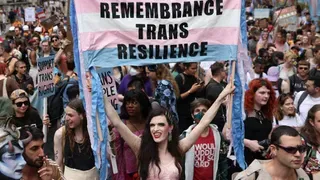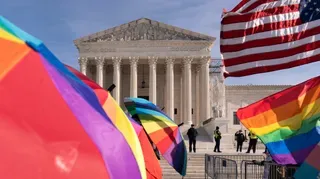October 19, 2013
At Values Voter Summit, Signs of a Morphing Republican Party
Kilian Melloy READ TIME: 4 MIN.
There was no surer sign that even the most conservative wings of the Republican Party are aware change is afoot in the United States than at this year's Values Voter Summit.
Held over three days at the Omni Shoreham Hotel in D.C., the annual political conference for social conservatives organized by the Family Research Council has become a mandatory stop for Republican presidential hopefuls. This year was no different, with Sens. Ted Cruz, Rand Paul, Marco Rubio and Rep. Paul Ryan all making appearances.
But unlike in years past, noticeably missing was some of the more vitriolic anti-gay rhetoric that has become a trademark of the conference. Although vague references were made to preserving traditional American families, language slamming LGBT-rights appeared to have little to no place in the primetime lineup - or from any elected official with a political future.
Cruz spent most of his time on stage slamming Obamacare, while also being interrupted by what seemed like an endless parade of hecklers protesting his stance on immigration reform. Paul spoke about a "worldwide war on Christianity" being waged by extreme elements of Islam that has been ignored by the mainstream media. For Rubio, his speech focused largely on faith and a Christian duty to help the less fortunate.
The Florida senator also appeared to summarize the feelings of many of this year's attendees best: "I know so many people around this country are discouraged by the direction our nation is headed," Rubio said. "I know so many of you are deeply disappointed at the way the last election turned out. And I know that many of you are increasingly scared that maybe we have lost or are losing our country."
It was indeed very different to be a "values voter" in 2013. When the same conference was held just a year ago, the country looked like a very different place. President Barack Obama, the first sitting president to openly endorse marriage equality, had not yet won re-election. There was no Sen. Tammy Baldwin, the upper chamber's first out member. There was no majority in the Senate supporting marriage equality, let alone three Republican senators supporting it. Voters had never once approved marriage equality at the ballot box and the Supreme Court had not yet struck down Section 3 of the Defense of Marriage Act as unconstitutional, nor had they returned marriage equality to California.
At last year's conference, Paul Ryan spoke to an enthusiastic crowd as the vice presidential nominee for the Republican ticket, in essence beefing up the conservative bonafides of Mitt Romney, who many social conservatives had approached with skepticism. This year, Ryan skipped the conference due to ongoing negotiations over the government shutdown and instead delivered a brief video statement that centered largely on the budget and deficit.
This is not to say the conference's trademark anti-gay rhetoric was missing entirely. Former Republican Arkansas Gov. Mike Huckabee railed against a California law protecting transgender students. Sandy Rios, a host on American Family Radio and a Fox News contributor, questioned the "fairytale" of Matthew Shepard's murder, postulating that it was a "total fraud" that had more to do with a drug deal gone wrong than Shepard's sexual orientation. She also said there are "tons of ex-gays with fabulous stories," while insisting there is a Christian duty to help gay people so as to halt the spread of HIV and disease.
"Anybody know an ex-gay?" Rios asked the silent ballroom. "You know, they are everywhere and the reason you don't hear about them is because they are maligned and threatened."
During a panel discussion about the "future of marriage," National Organization for Marriage President Brian Brown said the nation's ongoing argument over same-sex marriage "is not a live and let live debate." On one side of the debate are those who recognize children deserve the opportunity to have a mother and a father, said Brown, and on the other side is "an attempt to deconstruct the very nature of reality, the very nature of what it means to be a human being."
The Values Voter Summit was first held in 2006, but rose to prominence in 2011 when the conference sought to become a rival to the annual Conservative Political Action Conference (CPAC) after a riff between CPAC sponsors over the inclusion of the conservative gay group GOProud.
Republican politicians, particularly those who attended this year's conference, appear well aware of the tricky balance they must strike to ensure their political future. The Christian right and social conservatives still remain critical to winning any Republican primary, but the influence someone like FRC President Tony Perkins once held is waning. That did not stop Perkins from declining to invite New Jersey Gov. Chris Christie, who has said being gay is not a choice and signed a ban on ex-gay therapy for minors in August.
In an expansive "autopsy" of the GOP released in March following a series of defeats in November, the Republican National Committee argued a path forward for the party must include gay inclusion and outreach to minority communities previously ignored by the Republican Party. A Bloomberg National poll conducted last month found 55 percent of Americans and 70 percent of young people support allowing same-sex couples to marry. The Republican Party is almost evenly divided, with 52 percent opposed.
At this weekend's conference, Rubio shied from mentioning same-sex marriage, only to add, "I've also been lectured, as many of you have, about how we need to stop talking about social issues if we want to win elections. But if we're serious about saving the American dream, we can't stop talking about these issues. We can't stop talking about the importance of our values and our culture."
While Rubio urged social conservatives to stand firm, he himself avoided mentioning what specific issues they are standing firm for, illustrating that the specific language by which Republican leaders address issues important to their base is shifting just as much as the nation itself.
Kilian Melloy serves as EDGE Media Network's Associate Arts Editor and Staff Contributor. His professional memberships include the National Lesbian & Gay Journalists Association, the Boston Online Film Critics Association, The Gay and Lesbian Entertainment Critics Association, and the Boston Theater Critics Association's Elliot Norton Awards Committee.




